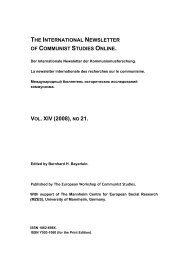11RXNdQ
11RXNdQ
11RXNdQ
Create successful ePaper yourself
Turn your PDF publications into a flip-book with our unique Google optimized e-Paper software.
The Political Thought of Patrice Lumumba* 97<br />
– because the Administration and the large companies had distributed the civil servants<br />
and the employees they had created all over the country. But the dream of creating a mass<br />
party collapsed: at best, it was a party of cadres and agitators. No one was to blame: it<br />
could not be any other way. The MNC was the Congolese petty bourgeoisie in the<br />
process of discovering its class ideology.<br />
Lumumba was the most radical: clear-sighted and blind at the same time, he may not<br />
have seen that his unitarianism was socially conditioned and impossible at that time, but<br />
he understood full well that the Congo’s problems were those of the whole of Africa;<br />
better still, his country would only find the strength to survive independence in the<br />
framework of a free Africa. He attended the Accra conference as a representative of the<br />
MNC. In a speech there, he commented in the following terms on the need for unity<br />
which was coming into being all over the continent and of which the Accra meeting was<br />
the direct consequence:<br />
‘This conference (…) reveals one thing to us: despite the frontiers that separate<br />
us, despite our ethnic differences, we have the same consciousness, the same<br />
soul that is steeped day and night in anguish, the same desire to make of this<br />
African continent a free and happy continent, released from anxiety, fear and all<br />
colonial domination.’<br />
Replace Africa with Congo, continent with nation, and you have the phrases he repeated<br />
every day in all the provinces of his country. This was because, for him, the Congo<br />
appeared to summarize all the differences which perpetuate African separatisms: here<br />
were provincial frontiers, ethnic and religious conflicts, economic differentiations of both<br />
a vertical (social strata) and a horizontal kind (geographical distribution of resources). In<br />
his eyes, therefore, there was only one task: to struggle for independence was to struggle<br />
not only for national unity, but, at the same time, for a free Africa. Conversely, as he<br />
made clear later, everything which hastened the integration of the many states into a<br />
single federation brought nearer the hour when the last of the colonized would rid<br />
themselves of their colonizers. The course of events has shown that on this point he had a<br />
practical and very clear-cut opinion: states that had attained independence should aid<br />
countries still subjugated to reject all domination in every way possible. Two and a half<br />
years later, as we know, when he felt that the frail Congolese Republic was on the brink<br />
of disintegrating, he asked for the support of Ghanaian troops. If he had won the game,<br />
the Congo would no doubt have aided Angola and all the neighbouring countries:<br />
Lumumba’s professed pan-Africanism attracted some of his most fearsome adversaries –<br />
the whites of Rhodesia and South Africa, and, more insidiously, the British<br />
Conservatives.A pan-African Congo would have been, first, an example, an<br />
encouragement in all those hearts that were still enslaved. But above all, that great<br />
country would have provided in countless ways the most effective support to the<br />
revolutionary organizations of the neighbouring countries, not only out of fraternity, but<br />
because it was the only viable African policy. The liberated Congo remained surrounded<br />
by deadly enemies; the blacks had to break their chains in Rhodesia and Angola and<br />
overturn Youlou’s neocolonialist government, or they would return to slavery in the<br />
Congo. What Lumumba hinted at – but as we know, he understood it immediately – was




